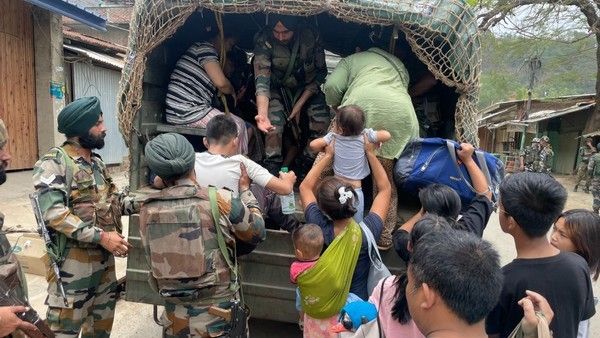
It has been more than a year now; still normalcy hasn't been restored in the Northeastern state of Manipur, which witnessed ethnic riots between Meiteis and Kuki-Zomis in May last year leaving more than 200 people dead and more than 60,000 displaced. As a result of the ethnic violence, Meitei-dominated plains have become free from Kuki-Zomis while the Meiteis are forced to flee from the hill areas dominated by Kuki-Zomis. The ground situation, nevertheless, remains worse as a result of the sharp polarisation, which has aided the rise of the armed ethnic militant groups both in the valley as well as the hills. The current spate of violence is due to these ethnic militant groups which target people from the other community.
The Centre, which is in command of the Unified Command of the state through its appointed security advisor Kuldiep Singh, has deployed central security forces in the state to deal with the violence. However, the activities of the armed groups — militants trying to revive taking advantage of the polarised situation — continue in the state. The expansion of the ethnic violence this year to Jiribam — untouched by last year’s violence in May — shows how the militants have strengthened themselves in the state. The state is so polarised that the activities of the security forces are also seen through a polarised lens. The Meiteis have alleged that the Assam Rifles is biased towards the Kuki-Zomis, who possess a similar view against the Manipur police. Such allegations against the security forces are not going to help the administration in restoring normalcy. The roots of these allegations have to be addressed. The Centre has to ensure that the non-biased activities of the security forces need to be visible on the ground.
True that effective security measures are crucial to check the violence but let's not forget that these measures won't be able to reduce the deep existing chasm between the Meiteis and Kuki-Zomis. Until and unless this divide is addressed, the peace achieved through effective security measures will always be fragile. It seems that the Centre too understands this reality. Recently, there was a peace meeting — in the absence of Union Home Minister Amit Shah — of legislators from Meitei, Naga and Kuki-Zomis in New Delhi with the officials of the Union Home Ministry. However, Kuki-Zomi legislators reportedly refused to sit together with Meitei legislators and held a separate meeting with the officials. This only defeated the main purpose of the peace meeting as the deep chasm was openly reflected.
Not only this, the criteria of the peace meeting to include only the legislators by excluding the voices of the civil society was a flawed decision. It is really silly to think that without including the representatives of the civil society there could be a productive dialogue on peace. It has to be mentioned that the Centre, after the crucial visit of Amit Shah to the strife-torn state in June last year, had formed a 51-member peace committee headed by then state governor Anusuiya Uikey. The peace committee, apart from having representatives from various political parties, had representatives from the various ethnic civil society groups. Unfortunately, the peace committee failed to take off as Kuki-Zomi groups refused to participate in the peace talks due to the presence of state Chief Minister N Biren Singh as a member in the committee.
Even after more than a year, it is really puzzling that the Centre never took the initiative to revive the peace committee. What is more surprising is the Centre’s hesitation in removing Biren Singh from the post of the chief minister, despite the fact that he has lost the faith of Kuki-Zomis as well as a section of Meiteis due to his failure to anticipate the ethnic violence. His tainted image, particularly among Kuki-Zomis, isn't helping either in restoring normalcy. That Biren Singh has lost faith of a significant section of the people, particularly Kuki-Zomis, is known to the Centre — so it has appointed Kuldiep Singh as the commander of the Unified Command, which is formed to ensure coordination between police and various central forces in the state. But it has stopped short of removing him — most probably to save the state government. It is unfortunate that political considerations seem to be the crucial priority for the Centre.
The need of the hour is encouraging effective dialogue to address the deep chasm that exists between Meiteis and Kuki-Zomis. But for that to happen, a suitable atmosphere needs to be created by the Centre, which needs to remove Biren Singh from the post immediately. Importantly, Amit Shah’s direct involvement in peace meetings is required to give legitimacy to these meetings.
The writer is a political commentator and columnist